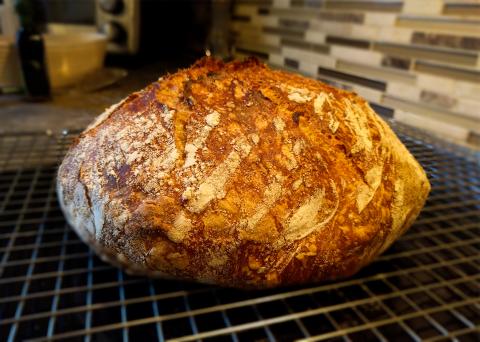
Minimum Effective Dose: 90% of the benefits for 10% of the effort

Making bread, great bread, takes some planning ahead and some dough babysitting. It's work worth doing, but sometimes you need bread fast. That's why I'm seeking the "minimum effective dose" for success. I heard this term coined in The 4 Hour Chef by Timothy Ferriss. It's not a groundbreaking concept, but he revolves much of his life around its pursuit, which is intriguing. He wants to find the balance of the best you can do with the least amount of work.
So, that's my question for the bread veterans out there. What is the minimum effective dose for great artisan/hearth bread? There will be times when I am able to plan 2 days ahead and get a great loaf full of complexity and flavor. But sometimes I realize around lunch that I'd like to have bread by dinner. So, let's say 5 hours from concept to a loaf emerging from the oven. On those days, I also don't want to wait around and fold the bread 4 times every 20 minutes. So, I need it to be pretty hands off.
Pictured is my first attempt. I used commercial yeast (of course) but also added unfed starter to the dough, not for the rising properties, but for flavor. I kept the hydration pretty high, since I wanted that hearth, open-crumb bread just not the long autolyse that goes with it. I also used AP flour because I wanted the yeast to be able to blow it up quickly. Those choices plus my desire not to clean a mixer, meant I didn't quite get the gluten development I was after by just hand kneading. Since I was going for speed, I proofed warm, which made it a bit hard to work with but not impossible with an assertive bench scraper. I think I can tweak those variables. It had good texture and decent crumb, and while not flavorless, I feel I can do better.
I'm considering America's Test Kitchen alternatives to Jim Lahey's bread. They add 1 tbl of distilled vinegar (for acetic acid) and replace 6 tbl of water with lager (for complexity). They do the long autolyse with a small amount of yeast. But I'm thinking to myself, if I'm adding the flavor in those forms, why not just use commercial yeast and save time? Wondering if anybody has tried this or has other tips on getting a loaf out quick.
I know there are folks who have already tread this path with wisdom to share!
(Not sure how to include an additional shot of the interior without separately hosting the image.)


Comments
I also hate having to wait more than a day for a good loaf of bread so occasionally I either just go through with a sourdough recipe and only let it rise twice and manage to get it in the oven by the end of the day and have it be mediocre OR I add beer to the dough. I only started doing this when I started working at an artisanal crafts beer shop and learned about all the different kinds of beers and how they're fermented. I'd as some beer in place of water in your recipe with the amount depending on your taste and the strength of the beer. But rather than using a dark ale as many suggest in beer breads, go for a sour beer like a gose style or dry hopped sour. This will add great complexity and flavor very easily due to the high levels of fermentation. That's my tip regarding flavor profile! Good luck!
I tend to use beer as well, but not just a few tablespoons - I usually replace between half and all the water depending on how strongly-flavored the beer being used is and how much beer flavor I want. In addition, since I'm not going to get as much flavor out of the flour, I'll often add cheese, olives and/or other add-ins for their respective tastes, and sometimes miso to boost the umami.
proofed and ready to go. A levain that is fully ready to go and a bit on the large side, say 25-30%, should easily raise a loaf and be ready for the oven in 4.5 hours without much worry if the temps are in the mid 70's and you put an instant yeast kicker in there when you mix the dough. Thos si what commercial bakeries do on a regular basis.
That means you have to make the levain before you go to bed and let it do its thing overnight so it is ready when needed and is at full strength. This should give you a bread with more flavor and sour. I'm doing something similar today but using yeast water for the kicker instead of IY. YW is notoriously slow compoared to instant yeast so I'm using 8 hours for the baseline but am doing a half hour autolyse. It might be done faster than 8 hours too. It is only 62 F in the kitchen so i'm working on a heating pad.
5 hours with instant yeast is my normal schedule for making enriched rolls for dinner or a loaf of yeast bread starting at lunch time. Getting stuff done in a certain time window is a good thing to master it is very handy indeed. I also have a start at 4 PM to get a from scratch dinner on the table by 6:15 PM. I have been following that for many years and it is amazing what you can get done. . It doesn't work for things that take a 4 hour braise or a 13 hour smoke but for most from scratch meals it isn't too much of a problem. Working Moms and Dads know that they have to get dinner on the table as soon as possible after getting home from work.... so a 2 1/4 hour window for a from scratch meal is pretty luxurious:-)
I'm with Argon. Putting seeds and nuts and dried fruits in the mix will also give a fast bread a flavor boost. Being fast doesnl't have to beb\ all bad as your loaf shows! Hope the crumb is a s nice as the outside. Fast is way better than none at all! Well done and
Happy baking
I use the float test before using my levain. It still takes my bread quite awhile to rise even so. I have 100% hydration/100% rye (that's the lazy streak in me). Maybe the key is as you suggest, using more for the bread itself. Good tip, thanks!
I will also try the other suggestions, too. Lately, my problem is that I don't want to bake bread every day (not because I don't love it, but because when I when I do, we eat the whole thing in a few hours and if we did that every day...oh my gosh...we'd gain 100 pounds.) But sometimes when I haven't baked bread, my husband gives me the puppy dog eyes around lunch, wanting bread for dinner. So, in those cases, I haven't got the levain ready to rock.
On a side note, I have been off gluten for a year. When I got back on it, well, I really got back on it!
I usually keep a half-loaf or two in the freezer. It can be sliced before freezing if you want to be able to take out less than the entire amount.
I've taken to slicing and freezing either the last bit of bread when my new loaf comes along, or baking two loaves at once and freezing one (sliced first). That takes away the anxiety of "I'm running out of my bread" before I can get a new one baked (a day or two process).
Of course, pulling a few slices of bread out of the freezer doesn't have nearly the wow effect of presenting a freshly baked loaf. But, it gets everyone fed with good bread!